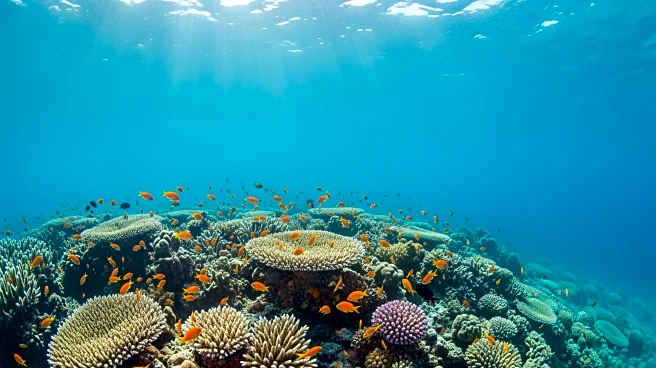What's Happening?
A recent study conducted by researchers at the University of Queensland has revealed that the Great Barrier Reef, which is facing a 'grim future' due to climate-induced heat stress, may experience a partial recovery if global warming is kept below 2 degrees
Celsius. The study utilized modeling to simulate the lifecycles of various coral species, discovering that some species possess a better ability to adapt to warmer ocean temperatures. The Great Barrier Reef has suffered significant damage in recent years due to severe heat stress, leading to rapid coral decline. The findings suggest that while the reef is on a trajectory towards further degradation by 2050, there remains hope for recovery if global temperature increases are controlled.
Why It's Important?
The potential recovery of the Great Barrier Reef is significant as it underscores the critical importance of global climate policies aimed at limiting temperature rise. The reef is not only a vital marine ecosystem but also a major contributor to biodiversity and a key driver of tourism and local economies. The study highlights the urgent need for international cooperation to mitigate climate change impacts, which could preserve the reef's ecological and economic benefits. Failure to address global warming could result in irreversible damage to the reef, affecting marine life, tourism, and the livelihoods of communities dependent on its health.
What's Next?
The study's findings may prompt policymakers and environmental groups to intensify efforts to curb global warming through stricter emissions regulations and international agreements. There is potential for increased advocacy and funding for conservation projects aimed at protecting coral species that show resilience to temperature changes. Additionally, the research could influence future climate negotiations, emphasizing the need for commitments to keep global temperature rise below critical thresholds to safeguard natural wonders like the Great Barrier Reef.
Beyond the Headlines
The study also raises ethical considerations regarding the responsibility of developed nations to lead climate change mitigation efforts, given their historical contributions to global emissions. It highlights the interconnectedness of global ecosystems and the need for a holistic approach to environmental conservation that considers both local and global impacts. Long-term shifts in climate policy could be influenced by such research, potentially leading to more sustainable practices and increased awareness of the importance of preserving natural habitats.
















